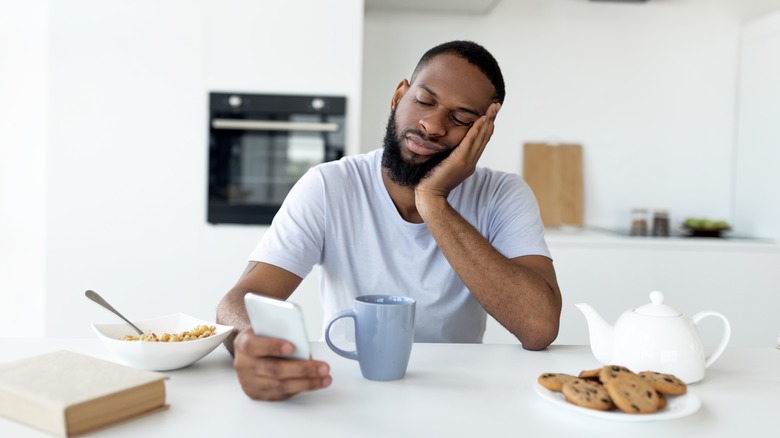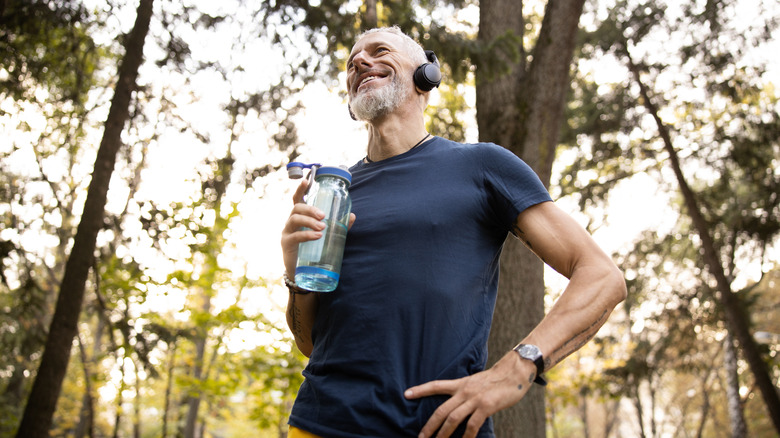How To Naturally Boost Your Energy Levels, According To A Leading Health Expert
While it'd be nice to have a constant stream of energy, life isn't always that kind. Especially as seasons change and we get older, energy levels might begin to fluctuate or even dip, despite attempts to boost it with things like caffeine. Health Digest spoke with Raelene Brooks, Ph.D., RN, and the Dean of the College of Nursing at the University of Phoenix, who shared some tips for increasing energy in natural ways.
According to Brooks, dips in our energy levels are pretty common. This could be due to things in our environment, like a decrease in sunlight, as well as internal factors, like hydration and nutrition. For example, sunlight helps our bodies to create serotonin, a neurotransmitter that affects energy, positive mood, focus, and calmness. "As the season changes and daylight decreases, there can be an effect on the body's energy levels," says Brooks. Serotonin is a precursor to the hormone melatonin, which is produced at night and helps us sleep well (via Environmental Health Perspectives). Brooks also noted that getting adequate sunlight benefits not only our mental health, but our bone health, blood pressure, and Vitamin D production. "Vitamin D production is important to note since there is research that links low Vitamin D levels with obesity and chronic fatigue," Brooks stated.
How physical conditions can impact our energy levels
Certain conditions can affect our energy levels, too, many of which have to do with how well oxygenated our bodies are. "When we are dehydrated, the red blood shrinks and this decreases the capacity for the cell to carry a full load of oxygen," Brooks shared. "Low oxygen levels are manifested by fatigue, irritability, and restlessness," Brooks tells us. Hyperglycemia, or high blood sugar, also impacts how well the red blood cells carry oxygen. This is because the cells become surrounded by glucose molecules, which are sharp and can damage the red blood cells, impacting their ability to transport oxygen.
Brooks explains that kidney disease can affect red blood cells, too, since the kidneys produce a hormone that helps them to regenerate. If you have congestive heart failure, your heart may not be as able to circulate blood and bring oxygen to the body's tissues. Chronic respiratory issues can cause our energy to dip as well, as the lungs become unable to fully assimilate oxygen into the body.
She adds that metabolism plays a role in energy, as well. If we experience hypothyroidism, or an under-functioning thyroid, our metabolism will slow down and cause fatigue. Lastly, sleep apnea is a major player in impacting our energy. "The obstruction of the airway during sleep creates a condition where oxygen is not effectively being inhaled and carbon dioxide is not effectively being exhaled," says Brooks. "A high carbon dioxide level induces irritability, sleepiness, fatigue, and restlessness."
Energy-boosting tips you can try at home
According to Brooks, there are things we can do to boost our energy levels without the use of stimulants like coffee and energy drinks. First, she recommends focusing on hydrating, which has a big impact on oxygen levels in the body. While it's not always possible to get in some physical movement every day, doing so could really impact your energy levels. "Exercise creates increased blood flow and heart rate," shared Brooks. "This allows oxygen to be circulated at a faster rate." You can also practice deep breathing to get a boost of energy. "Practice inhaling and exhaling several times to increase oxygen to the body," Brooks says.
But unfortunately, it's not a quick fix. "It takes consistent application of changes made to factors affecting energy levels," Brooks explains. Whether you're focused on getting more sunlight, drinking more water, or taking midday walks, you'll have to stick to these routines for a while in order to see results. But once the changes have become consistent, the body will adapt quickly.
To learn more about Dr. Brooks, read about her appointment to Dean of the College of Nursing here.



